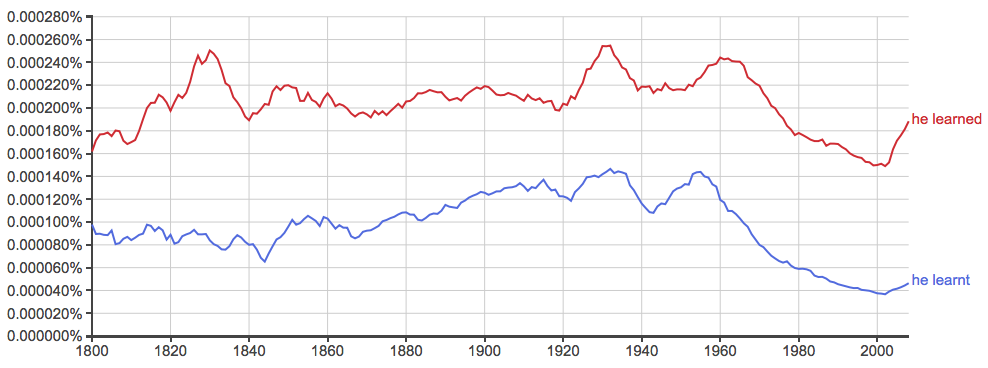Many words are spelled differently in American and British English, even if they fulfill the same function in a sentence.
Learnt and learned are two different spellings of the same verb. One is accepted in British English, but not in American English.
Depending on where you are writing, you might choose learnt or learned. But, which is it?
Continue reading to find out.
What is the Difference Between Learnt and Learned?
In this post, I will compare learnt vs. learned. I will use each spelling in an example sentence to demonstrate its proper context. Plus, I will show you a mnemonic to help you decide whether you should use learned or learnt.
When to Use Learned
 What does learned mean? Learned can be an adjective or a verb.
What does learned mean? Learned can be an adjective or a verb.
As an adjective, learned is a synonym of knowledgeable and sometimes describes to a person who is highly educated. The sentences below demonstrate the usage of learned as an adjective.
- The learned astronomer told me that Pluto is not a planet, but I will always disagree.
- When I became a learned man, I saw the world in a different way.
As an adjective, learned is pronounced with two syllables. The first syllable is stressed, much the same way as the word perfect (ler-ned)
Of course, learned is also the past tense form of the verb learn, which means to acquire knowledge. See the following sentences for examples.
- When I was young, I learned to ride a bicycle.
- The snowman learned not to spend too much time in greenhouses.
- Thone introduced her to roller skiing about 12 years ago. He had learned about it from other coaches and elite Nordic skiers, who were using it for off-season training. –The Wall Street Journal
When to Use Learnt
What does learnt mean? Learnt is an alternative spelling of the same word. It rhymes with burnt. It is only used as a past tense verb, and only in British English, like in these sentences:
- “My big brother learnt his math at Cambridge,” the little orphan boy lied.
- Fifty years ago he used a fairly minor motorcycle accident as an excuse to step away from the spotlight. But the end of the “perfect” Dylan – the one who fused what he had learnt from Woody Guthrie and the symbolist poets with the energy of rock’n’roll, and who mocked the world from behind impenetrable shades – did not mean the end of his creativity. –The Guardian
As you can see in the chart below, which graphs the appearance of the phrases “he learned” and “he learnt” in British English books since 1800, learnt is less common even in that corpus.

This chart is not scientific or infallible, since it only tracks word use in books written in English, ignoring all other sources. Still, it helps visualize a clear long-term trend.
Trick to Remember the Difference
 Here is a helpful trick to remember learned vs. learnt, and it is a pretty simple one.
Here is a helpful trick to remember learned vs. learnt, and it is a pretty simple one.
You should probably never use learnt. It is only common in British English as a past tense verb, and even in that context, it is overshadowed by learned.
In situations where you want to capture the way some speakers of English might actually talk, it could be helpful to choose learnt over learned. At all other times, choose learned instead.
You can remember to choose learned over learnt since learnt rhymes with burnt. Just like you wouldn’t want to eat a burnt cookie if there were other cookies available, you wouldn’t want to use learnt if there were other words available.
There is another word available; that word is learned.
Summary
Is it learnt or learned? Learnt and learned are variant spellings of the past tense form of the verb learn, which means to acquire knowledge.
- As an adjective, learned is the only appropriate spelling, and it is pronounced with two syllables.
- Learnt is more common in British English than American English but is still overshadowing by learned.
You should always choose learned, especially in formal writing. It is more common even as a British English verb, the one context where learnt is accepted.
You can remember to avoid learnt since it rhymes with burnt, and most people also seek to avoid things that are burnt.
Contents
